
Researchers develop plant-based jet fuel
By DE Staff
General Aerospace EnergyWSU study finds aromatics-free, lignum-based jet fuel outperforms petroleum fuel while cutting emissions.

Pacific Northwest National Laboratory scientist at Richland, Wash., helps develop a sustainable fuel component as part of research into bio-based jet fuels.
(Photo credit: Pacific Northwest National Laboratory)
According to Bin Yang, professor with WSU’s Department of Biological Systems Engineering and co-author of a study recently published in the journal Fuel, the lignin-based fuel displayed increased energy density and could totally replace aromatics.
“Aromatics are associated with increased soot emissions, as well as contrails, which are estimated to contribute more to the climate impact of aviation than carbon dioxide,” said Joshua Heyne, co-author, University of Dayton scientist and current co-director of the joint WSU-Pacific Northwest National Laboratory Bioproducts Institute.
“Aromatics are still used in fuel today because we do not have solutions to some of the problems they solve: they provide jet fuel with a density that other sustainable technologies do not,” he added. “Most unique is their ability to swell the O-rings used to seal metal-to-metal joints, and they do this well.”
Yang developed a patented process that turns lignin from agricultural waste into bio-based lignin jet fuel. Such sustainable fuel, the researchers say, could help the aviation industry reduce dependance on increasingly expensive fossil fuels while meeting higher environmental standards.
Additional contributors to the study include Zhibin Yang, University of Dayton; Zhangyang Xu and Maoqi Feng, WSU; John Cort, Pacific Northwest National Laboratory; and Rafal Gieleciak, Natural Resources Canada.
Yang and his team’s research has been supported by the DARPA through the U.S. Department of Defense, the U.S. Department of Energy, the National Science Foundation, the U.S. Department of Transportation, the National Renewable Laboratory, the Joint Center for Aerospace Technology Innovation and WSU’s Bioproducts, Science and Engineering Laboratory.
https://bsyse.wsu.edu
